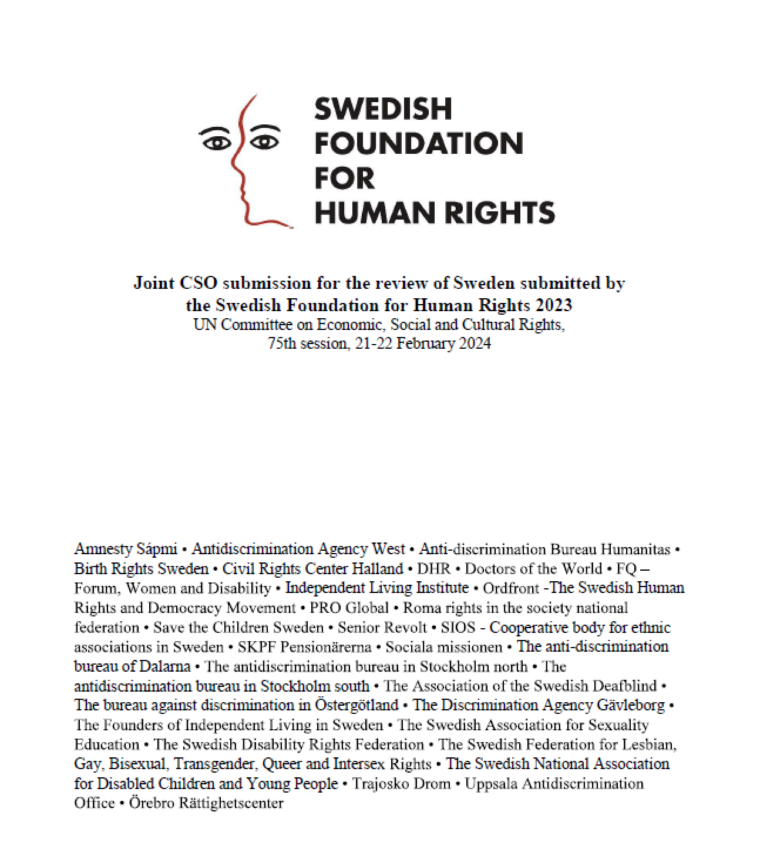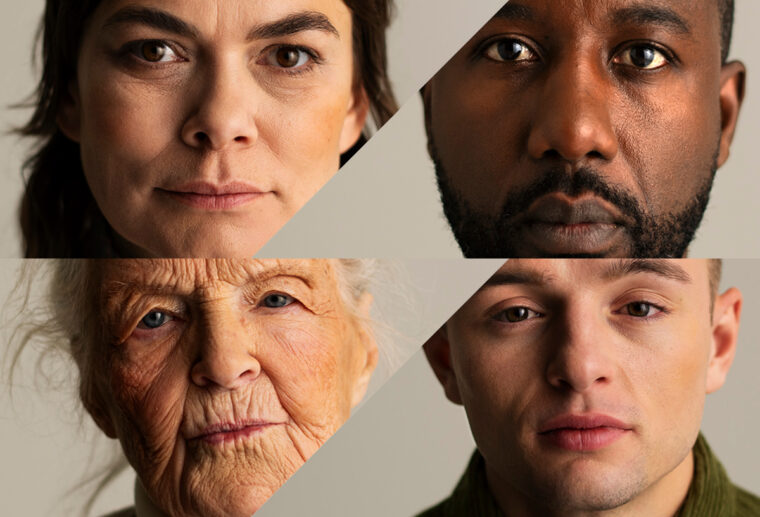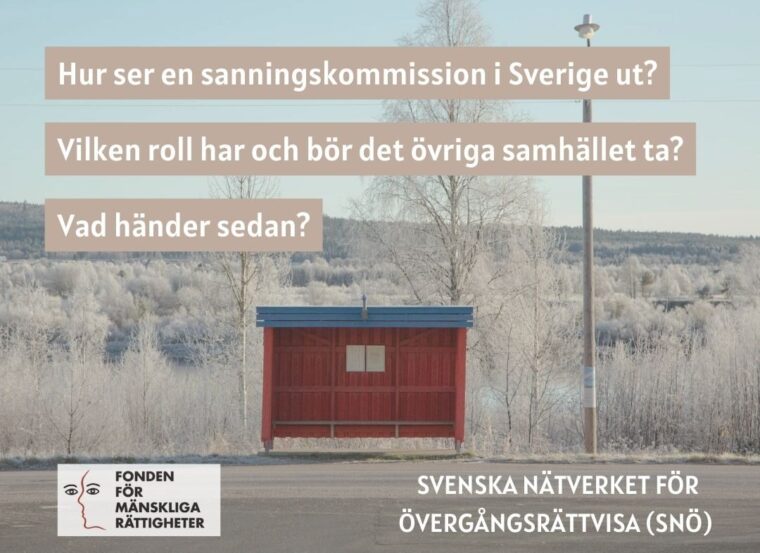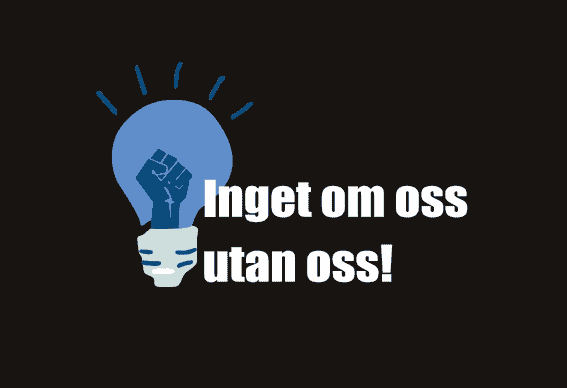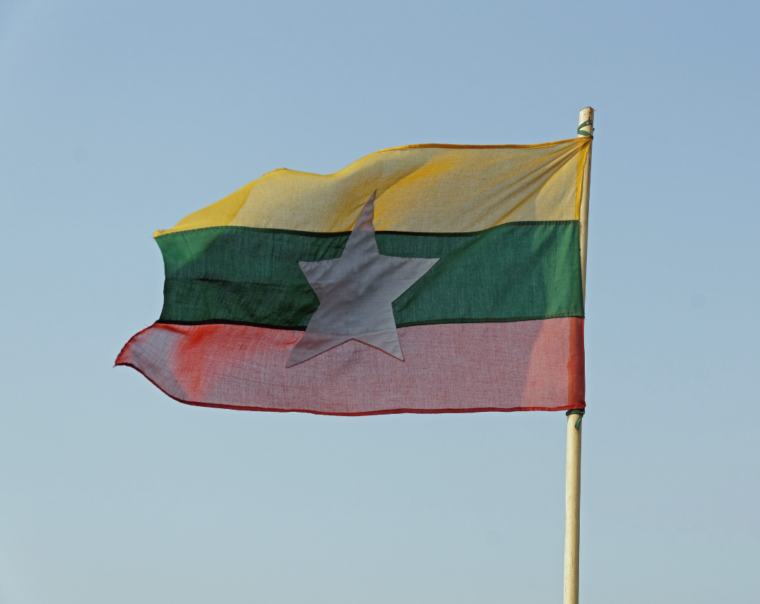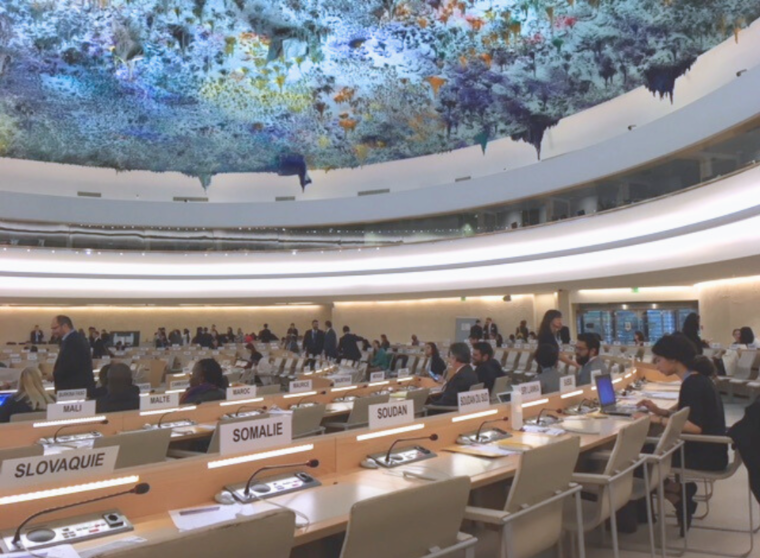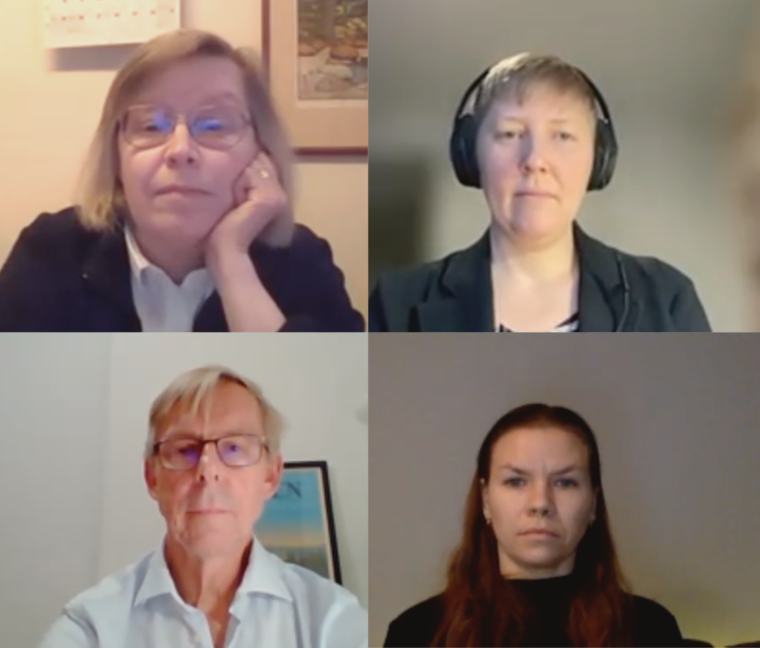
Från vänster till höger: Kajsa Syrjänen Schaal, Malin Arvidsson, Anders Kompass, Josephine Ylipää. Syntolkning: Foto från zoom på seminariets deltagare.
Den 15 december 2023 anordnade MR-Fonden i samarbete med Svenska nätverket för övergångsrättvisa (SNÖ) ett digitalt seminarium om sanningskommissionen för tornedalingar, kväner och lantalaiset som nyligen lämnat in sin slutrapport. Syftet med frukostseminariet var att uppmärksamma sanningskommissionens arbete, vilken roll det övriga samhället har och bör ta och diskutera vad som händer efter slutrapporteringen.
Medverkande
Malin Arvidsson, ledamot i kommissionen. Malin är fil. dr i historia och har varit verksam vid Avdelningen för mänskliga rättigheter, Historiska institutionen, Lunds universitet. Malins forskning är inriktad mot historisk rättvisa. För tillfället är Malin lektor på Tema Barn vid Linköpings universitet. Sedan 2021 ingår Malin i det tvärvetenskapliga projektet “Truth and Reconciliation in the Nordic countries” (TRiNC), baserat vid Danish Institute for International Studies (DIIS).
Kaisa Syrjänen Schaal, ledamot i kommissionen. Kaisa är jurist och senior policyrådgivare i Svenska kyrkan och expert på minoritetsfrågor. Kaisa har arbetat med minoritetsfrågor i Regeringskansliet, det statliga utredningsväsendet och inom civilsamhället. Kaisa var huvudsekreterare i Utredningen om uppföljning av minoritetspolitiken och Utredningen om finska och sydsamiska språken.
Josephine Ylipää, utredningssekreterare i kommissionen och arbetade bl. a. med insamling och analys av intervjuberättelser, och medförfatta slutbetänkandet. Josephine är fil. master i hållbarhetsvetenskap och har arbetat med forskning inom hållbarhet, landsbygdsutveckling och rättvisa i Asien, Afrika och Europa. Josephine är också tidigare ordförande i ungdomsorganisationen Met Nuoret.
Charlotta Göller, programansvarig och folkrättsrådgivare vid MR-Fonden. Charlotta har lång erfarenhet av att arbeta med mänskliga rättigheter, både internationellt och i Sverige. Hos MR-Fonden ansvarar Charlotta för parallellrapporten till FN:s kommitté för ekonomiska, sociala och kulturella rättigheter som MR-Fonden samordnar samt är samordnare av MR-nätverket som samlar över 50 civilsamhällesorganisationer.
Moderator för eventet var Anders Kompass, styrelseledamot för Fonden för mänskliga rättigheter, med lång karriär från bl a FN och UD.
Referat
Anders Kompass öppnade seminariet och välkomnade medverkande och åhörare.
Charlotta berättade inledningsvis om temat övergångsrättvisa och att sanningskommissioner är ett av många exempel på en stats försök att komma tillrätta med storskaliga människorättskränkningar, en del av det som kallas övergångsrättvisa. MR-Fonden har jobbat specifikt med övergångsrättvisa sedan 2006. På ett seminarium som anordnades för flera år sedan, när en samisk sanningskommission började komma på tal, sa en av deltagarna att ”det är jätteviktigt att ni som icke-samiska organisationer krokar arm med oss och gör gemensam sak”. Med detta i åtanke, vill MR-Fonden bidra till att lyfta fram det arbete sannings- och försoningskommissionen för tornedalingar, kväner och lantalaiset har gjort och vad som ligger framför oss. Majoritetssamhället behöver lyfta blicken och visa att det handlar om mänskliga rättigheter och berör oss alla.
MR-Fonden har bland annat stöttat den colombianska sanningskommissionens arbete här i Sverige. Från den processen konstateras att en sanningskommission och dess rapport är starten på en långsiktig process. En sanningskommissions rekommendationer kan ha stor betydelse om de förvaltas och genomförs. En sanningskommission rör inte enbart dem som utsatts för kränkningar av mänskliga rättigheter utan även dem som har begått kränkningarna. Skyldighetsbärarna (staten i dess olika nivåer) måste involveras och ta ansvar för att rekommendationerna genomförs.
Efter Charlottas inledning berättade de tre övriga medverkande om deras olika ingångar till att bli inbjudna att vara en del av kommissionens arbete. Alla tre har från sina olika perspektiv varit delaktiga i processer som berörde innehållet i kommissionens arbete; utifrån personliga och yrkesmässiga erfarenheter.
Anders Kompass konstaterade att det blev en positiv överraskning över hur många som deltagit vid lanseringen av slutrapporten och det mediala genomslaget – särskilt då det varit ganska tyst under själva processen. Han bad panellisterna berätta om arbetsprocessen och mer specifikt hur de arbetade med förankringen i minoritetsgruppen, samarbetet med övriga nordiska länder och om det var något de saknade från majoritetssamhället under kommissionens gång.
Kaisa berättade att kommissionen tidigt bestämt vilka principer de skulle jobba enligt; långsiktighet, minoriteten ska komma stärkt ut av processen, transparens och verka på minoritetens egna arenor på deras villkor. Förankringen var viktig och stort fokus lades på detta. De drog på erfarenheterna från Svenska kyrkans arbete med vitboken om samer. Pandemin komplicerade genomförandet av arbetet men de hittade alternativa vägar.
Josephine höll med om att förankringen varit viktig. När sanningskommissionen tillsattes hade ingen förankring gjorts inom minoritetsgruppen och de inledde med uppstartsmöten på olika platser i regionen. Dessutom lät de forskare ta fram underlag för olika teman. I efterhand ser de att det hade varit en fördel att definiera temaområdena efter intervjuerna då det var så många ämnen som dök upp under intervjuerna som hade varit relevant att ta med.
Efter pandemin ordnades s.k. ”kaffemöten” inom det geografiska området. Att dricka kaffe hos grannar i Tornedalen är en stark kultur och det var den norska sanningskommissionen som gav dem idén till metoden. På kaffemötena, som skedde helt öppet och som hade annonserats i förväg, berättade de om uppdraget och bjöd in människor att dela sina erfarenheter. Detta ledde till många fina samtal.
Kommissionen la vid mötena vikt även vid kulturella inslag för att inte bara ”komma och presentera”. Sanningskommissionen uppmanade människor att delta i intervjuer men betonade att de var helt frivilliga. Det fanns ett stort intresse. Slutligen gjordes en förankringsturné, ”Påtåren/toinen kuppi”, på andra orter än de tidigare besökta. Bristen på resurser var en stor begränsning och de kunde inte göra lika många uppföljningsmöten som de hade önskat.
Malin berättade att kommissionen har betraktat arbetet som en nationell angelägenhet och löpande arbetat med att nå ut, t ex genom pressmeddelanden, nyhetsbrev och öppna symposier. När det gäller kaffemötena har det behövt göras avvägningar kring journalisters närvaro – det är både viktigt att nå ut till en bredare allmänhet och att skapa bra förutsättningar för samtal för dem som är på plats.
Gällande det nordiska samarbetet så gjordes flera avstämningar med det norska sekretariatet, berättade Malin. De sysslar med liknande saker: intervjuer, samlar forskning, skriver slutbetänkande – även om det sker i olika former. Norska kommissionen blev tillsatt av Stortinget (riksdagen) som följer upp, den svenska lyder under Kulturdepartementet. I Danmark där en överenskommelse träffats om att granska förhållandet till Grönland under efterkrigstiden har man valt att låta forskare ansöka om att genomföra utredningen.
Alla resor som gjorts inom ramen för den svenska kommissionen är något ovanligt i det svenska utredningsväsendet och det har varit komplicerat att hitta former för detta. Om ett liknande initiativ skulle tas i framtiden vore det viktigt att fundera mer grundligt på de administrativa formerna.
Anders bad de medverkande reflektera över överlämnandet av rapporten och hur den togs emot av minoritets- respektive majoritetssamhället och om vad som händer nu.
Josephine sa att det är tydligt genomgående i processen att den här minoritetsgruppen inte har synts mycket. Att få fira den gav mycket glädje och den mediala uppmärksamheten bidrog. Människor hade rest långt för att komma till Pajala och det var viktigt att presentationen ägde rum i minoritetsområdet. Många verkar vara nöjda med hur bra det blev, särskilt med Tornedalsteaterns och Svenska kyrkans evenemang på olika platser i Stockholm och Luleå – det skapade hopp. Minoritetsgruppen är inte van att få så mycket strålkastarljus, det är vanligtvis litet fokus nationellt på den här gruppen. Kanske gör det att tystnaden nu efter känns ännu mer.
Kaisa kommenterade att det var svåra beslut – att prata om det svåra eller fira? De visste att ministern bara kunde vara där en stund och bestämde sig för att fortsätta på kvällen och det var bra för då kom många personer fram kring kaffet. Det blev bättre än hon trodde det skulle bli.
Malin sa att det var en intensiv dag, där många av de deltagande hade skiftande roller – alltifrån den formella överlämningen till att medverka i uppläsningar och ge intervjuer. Det här visar på vilket arbete det kräver att driva de här frågorna, ett arbete som till största del sker ideellt. Det behövs organisationsbidrag, bättre förutsättningar att verka framåt.
Anders frågade om hur reaktionen blev från minoritetsgruppen, om de har läst rapporten?
Kaisa berättade att kommissionen var väldigt tacksam att Tornedalsteatern läste upp berättelserna från rapporten vid lanseringen, det var enormt berörande. Inom Svenska kyrkan förs samtal om hur de ska gå vidare, t.ex. i Luleå stift. Det finns en stark medvetenhet att det behövs göras hos dem som skyldighetsbärare och det kom fram mycket om det i intervjuerna.
Josephine sa att de inte fått så många reaktioner utan mest kommentarer om att människor har börjat läsa – det är ändå tre volymer på 1 700 sidor. Nu är utmaningen att det inte ska glömmas bort. Hon upplever en oro över att processen ännu inte har gått vidare. Det har inte publicerats något på departementets hemsida om efterarbetet. Rekommendationen var att en handlingsplan skulle läggas på en gång men det har varit väldigt tyst från departementet. Hon hoppas att de arbetar för fullt för att de ska kunna återkomma med något bra! Josephine arbetar nu som konsult för implementeringen. De har konstaterat att minoritetsgruppen har väldigt lite resurser och behöver mer pengar för att kunna arbeta med försoning så att det inte bara blir staten som leder försoningen. Att aktivt kunna arbeta med vidareprocessen blir avgörande.
Anders ställde sedan frågan till panelen om hur diskussionerna gick under arbetets gång för att bereda marken?
Malin sa att kommissionen varit noga med att understryka att dess arbete inte är en uppgörelse med det förflutna, en gång för alla, utan del av en längre process. Samtalen om fortsättningen har ägt rum under arbetets gång, många symposier har arrangerats och forskarrapporter har släppts löpande. Det arbetet har gjorts kontinuerligt även om strålkastaren var mot den 15 november då slutrapporten presenterades. Att samla människor löpande har förhoppningsvis stimulerat till det vidare arbetet.
Kaisa kommenterade att vissa processer kom igång under arbetet. Utifrån det pågår t ex ett arbete med kvarlevor – hur de ska återbördas och återbegravas. Det är ett resultat av kommissionens arbete. En del trådar lever nu sina egna liv.
Josephine sa att det finns flera saker som berör sanningskommissionen men som är enskilda projekt, t.ex. resursbibliotek för meänkieli, förskolor för meänkieli. Hon hoppas på att slutrapporten och kommissionens arbete möjliggör att andra får mer resurser. Att det blir mer permanent genom att den här statliga utredningen pekar på att detta behöver göras.
Anders ställde sedan en fråga om vad som förväntas av majoritetssamhället? Är det en känslig fråga? Behövs en ursäkt? Utifrån hans internationella erfarenhet är inte kommissionens rekommendationer revolutionära förslag, utan genomförbara, praktiska och självklara saker för majoritetssamhället. Handlar det om resurser?
Kaisa konstaterade att det finns viktiga saker att göra: synliggörande av materialet där olika aktörer kan bidra till att ta till sig materialet, att fundera på vad vi kan lära oss av materialet – oavsett vilken organisation man kommer från. Det finns ett stort behov inom minoritetsgruppen att få prata om det som kommit fram. Det behöver inte vara så svårt, det finns många möjligheter för civilsamhället. Bara att MR-Fonden gör det här seminariet är jättebra. Det här är en väldigt osynlig minoritet, hur ska de kunna komma att påverka? Deras möjligheter behövs stärkas upp.
En ursäkt behövs! Särskilt för de äldre, de kan inte vänta eftersom de yngsta är i 80-års åldern. Här behövs snabbspår för en ursäkt för att hinna ge dem upprättelse.
Malin kommenterade att volym 3 som är baserad på intervjuer är en bra utgångspunkt för studiecirklar. Samtalet Svenska kyrkan ordnade på kvällen visade på att det finns ett behov av att mötas. Även vi som arbetar på högskolor behöver hjälpas åt, lärare behövs utbildas och ta del av kommissionens resultat för att hantera de diskussioner som kan uppstå.
Anders avslutade med att konstatera att vi alla känner en stor kunskapslucka. Det är en fantastisk möjlighet för oss i majoritetssamhället att lära oss om vår historia. Att detta fortsatte in på 50-talet, då han föddes – det är skrämmande att det saknades undervisning om detta. Det är nu ett viktigt arbete för hela Sverige.
Panelen konstaterade att kommissionen nu skickat vidare till kulturdepartementet och regeringen vad nu kommissionen vill ska ske. Att snarast remittera förslaget och inleda dialog med minoritetsgruppen är det som ska vara högst prioriterat. Som ministern sa på rapporteringsdagen: ”det är viktigt att vi tar vidare” – nu behöver regeringen visa att de menar allvar, att det inte blir vidare kränkningar och att börja förankra med minoriteten hur det vidare arbetet ska genomföras. Tidigare utredningar på andra platser har visat att detta är helt avgörande.
